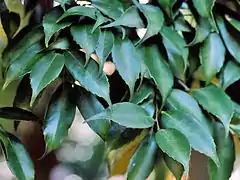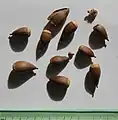| Castanopsis cuspidata | |
|---|---|
 | |
| Scientific classification | |
| Kingdom: | Plantae |
| Clade: | Tracheophytes |
| Clade: | Angiosperms |
| Clade: | Eudicots |
| Clade: | Rosids |
| Order: | Fagales |
| Family: | Fagaceae |
| Genus: | Castanopsis |
| Species: | C. cuspidata |
| Binomial name | |
| Castanopsis cuspidata (Thunb.) Schottky | |
| Synonyms | |
|
Pasania cuspidata (Thunb.) Oerst. | |
Castanopsis cuspidata (Japanese chinquapin; Japanese tsuburajii, 円椎) is a species of Castanopsis native to southern Japan and southern Korea.
It is a medium-sized evergreen tree growing to 20–30 m tall, related to beech and oak. The leaves are 5–9 cm long and 2–4 cm broad, leathery in texture, with an entire or irregularly toothed margin. It grows in woods and ravines, especially near the sea.
The cotyledon of the nut is eaten boiled or roasted.
Its dead wood serves as host to many mushroom types, including the shiitake, which literally means Castanopsis mushroom.
Gallery
 Bark of base of mature tree
Bark of base of mature tree Tall trunk of mature tree
Tall trunk of mature tree Slender, fountain-like canopy of mature specimen, viewed from beneath
Slender, fountain-like canopy of mature specimen, viewed from beneath Mature, deep green leaves
Mature, deep green leaves Flowering shoots
Flowering shoots Closeup of slender inflorescences
Closeup of slender inflorescences Edible seeds/nuts
Edible seeds/nuts_Schottky_(AM_AK375744-2).jpg.webp) Preserved specimen from herbarium, with descriptive notes
Preserved specimen from herbarium, with descriptive notes Dead trunk, with fruiting bodies of shiitake
Dead trunk, with fruiting bodies of shiitake
References
- ↑ Barstow, M. (2018). "Castanopsis cuspidata". The IUCN Red List of Threatened Species. IUCN: e.T62004530A62004533. doi:10.2305/IUCN.UK.2018-1.RLTS.T62004530A62004533.en.
External links
- "WCSP". World Checklist of Selected Plant Families. (enter "Castanopsis cuspidata" in search box).
This article is issued from Wikipedia. The text is licensed under Creative Commons - Attribution - Sharealike. Additional terms may apply for the media files.
